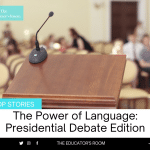Have you signed up for The Educator’s Room Daily Newsletter? Click here and support independent journalism!
I knew that I wanted to be a high school English teacher from the time I was a freshman in high school. But as the child of a SAHM, I had also convinced myself that I was destined for the same future. I would teach for a few years, have kids, go to grad school while my children were young, and then return to teaching once they were all in school full time.
By the time my first child was born, seven years into my teaching career, I had to be honest with myself and my family. I loved my kids and wanted to spend as much quality time with them as possible. But I wanted to continue having adult conversations with colleagues and young adults. I needed the help of early childhood professionals so I could continue working outside the home.
During this time, I wanted the adults spending eight-plus hours a day with my kids to be experts. I wanted them to know how to best help my children learn their numbers and letters and how to read. I wanted them to utilize research-based practices to keep my kids inquisitive and help their little brains learn everything that they could possibly absorb. I needed to know that the teachers in their classrooms weren’t just doing their best; I wanted them to be the best.
Why Early Childhood Educators Matter
Why? Because strong early childhood programs set the foundation for the rest of our educational system. For some of the luckiest American children, particularly those who do not have a parent staying at home with them, their first classroom experience is in daycares that transition to preschool programs. Both of my children thrived in such an environment. From the time they were toddlers, they had caring adults around them. These adults guided them through the learning process with plenty of interaction, playtime, and socialization. Once both of my children entered kindergarten, they were ready for the challenges of a more rigorous classroom.
But this isn’t the case for every child. And this disparity affects all of our students the further they get down the education road.
Early childhood programs should be the model on which the rest of our system lies: play and inquiry-based education directed by teachers who have educational experience and an understanding of the brain science behind their pedagogy.
Early Childhood Educators Are Underpaid and Undervalued
We should want early childhood experts setting the tone for our system. Instead, we’ve disrespected the profession, demoting the job to a nearly minimum wage position with a high turnover rate. The average cost of daycare in the US is $8355. The average price for a preschool program ranges from 4,460 to $13,158 a year. Yet, as of 2020, the median salary for a preschool teacher is $31,930. There are many wonderful and bright individuals, mostly women of color, who are caring for our youngest students. But they are not being retained. And many lack access to training to understand the how and the why of what they are doing with children every single day.
Why does this matter so much to me? Because these small children will someday be in my high school English classroom. After nearly 20 years of teaching young people and trying my hardest to mold them into young adults, I’ve concluded that we need to do better by them from the very beginning.
A Mom’s Case for Early Childhood Educators
In addition to being a high school English teacher, I’ve been a mom for nearly thirteen years. I love my own children. I love spending time with them, I love watching them grow, and I love just sitting and talking to them. They are some of my favorite people in this world.
But I never could have been their early childhood teachers.
I have an active imagination, but I struggle to think like a four-year-old. I love to read children’s books out loud and have treasured storytime with both of my own kids. But I can’t handle multiple interruptions by several voices at once. I find the viewpoints of small children entertaining, but I crave the semi-adult conversations I get to have with teenagers. And while literacy is the foundation of my profession, I have no idea how to teach kids how to read. This became painfully apparent when our book-loving son was taking his sweet time learning all of his letters and numbers.
How We Can Respect Early Childhood Educators
The teachers who helped my children learn to read and write are my heroes. And because they are my heroes, I believe that we should be seeking the best and the brightest to be early childhood educators. We should be creating education and career paths for those who are already lovingly working with our children, but have been unable to get a college education. And we should treat these educators like the experts in early childhood development that we need them to be.
We need to stop telling young men and women – but let’s be honest, most of them are women – that they are too smart for careers in early childhood. We need to break the belief that early childhood educators are “just” caretakers instead of teachers. We need to bust the myth that early childhood is an easy educational career path and that it is only for women, because neither of those beliefs are true. We need to put energy into building a strong foundation on which the rest of our educational system is built.
Equality isn’t just about treating women equally. It’s also about treating the professions frequently held by women with enough respect that men want to join as well. It’s about the career not being considered “too good” or “too feminine” or “not challenging enough” for men. Let’s celebrate it as a career for anyone who loves children and wants to be a part of developing their futures. It’s about the individuals in early childhood being trained as experts and paid for their expertise. And it’s about listening to them when they tell us that we have our early childhood goals all wrong and supporting their efforts to reform a broken system, reforms which will benefit all levels of education for generations.
This high school teacher and mom of two has learned to value what my early childhood colleagues have to offer. It’s time for the rest of the country to catch up.
High school students’ road to success begins early. Let’s train and pay early childhood educators what they deserve and make the whole education system stronger.
Editor’s Note: If you enjoyed this article, please become a Patreon supporter by clicking here.







I am an elementary teacher. Most of my career has been at the k level. I want to thank you for recognizing my contributions and that my job actually makes a difference. As a mom of 2, the day care and preschool staff that help care for my children were blessings. They helped form my children into the beautiful people the are growing up to be. I will forever be grateful to those women (they were all women!)
When the housing market crashed, school budgets were impacted. There were a lot of lay-offs in my area around 2010-12. The districts increased class sizes to maximum capacity. Those of us who kept our jobs were supposed to be thankful, but those years were some of the worst teaching years I’d ever experienced. My district allowed TK-2nd grades to have up to 34. In a neighboring district, their class sizes were 40. Kindergarten teachers joined forces to fight to improve learning conditions. We went to school board meetings and spoke as much as possible. I took a restroom break at one of the board meetings. In the bathroom, I overheard two high school teachers who were angry we were asking for smaller class sizes. When I asked them about it while I washed my hands, they taunted me. They stated that in their eyes, we were whiners. We gave teachers a bad rap. Our jobs weren’t hard. All we did was paint and sing songs and take naps. How could that be hard compared to their jobs? I was in tears. I understood their jobs had challenges, too. I would never argue against that. I understood we were fighting for resources and money. They acted like we were siblings fighting over the attention of our parents. What they failed to see is that we were on the same side.
On a different occasion, a HS science teacher came over to spit obscenities at us. She was holding her infant daughter at the time. She took this moment to tell us how we sucked at teaching science, and we made her job impossible. She would never allow her daughter to enter our classrooms because we were so wretched. She didn’t bother to listen to any of our speeches. One second grade teacher spoke about how we weren’t allowed to teach all the standards, and that needed to change. At the time, we were required to stick with our ELA or math with fidelity. Even if we had the freedom to do as we were trained to do, we had no science materials. We had new social studies materials, but we were banned from unwrapping them from the cellophane.
I could take the school board tuning out our requests. Having a colleague disrespect us was the most painful thing.